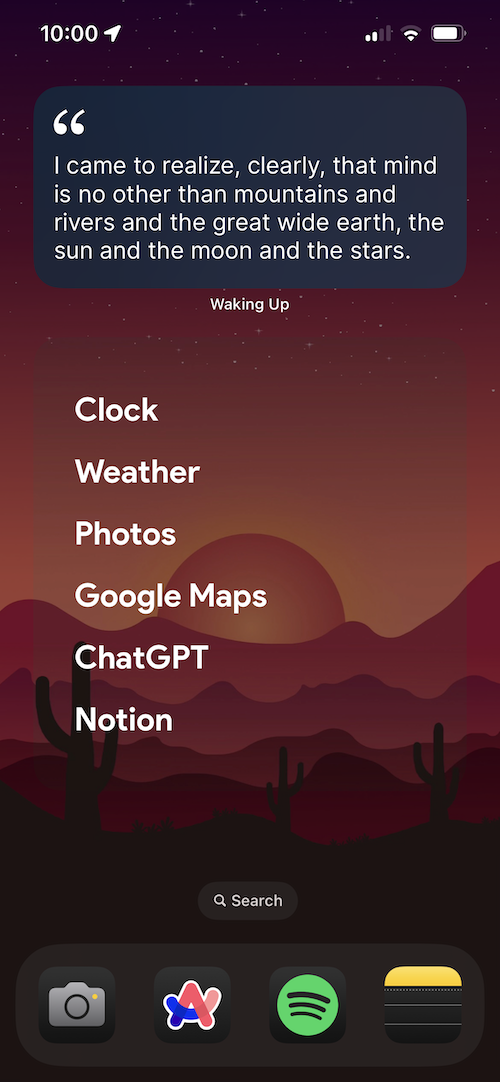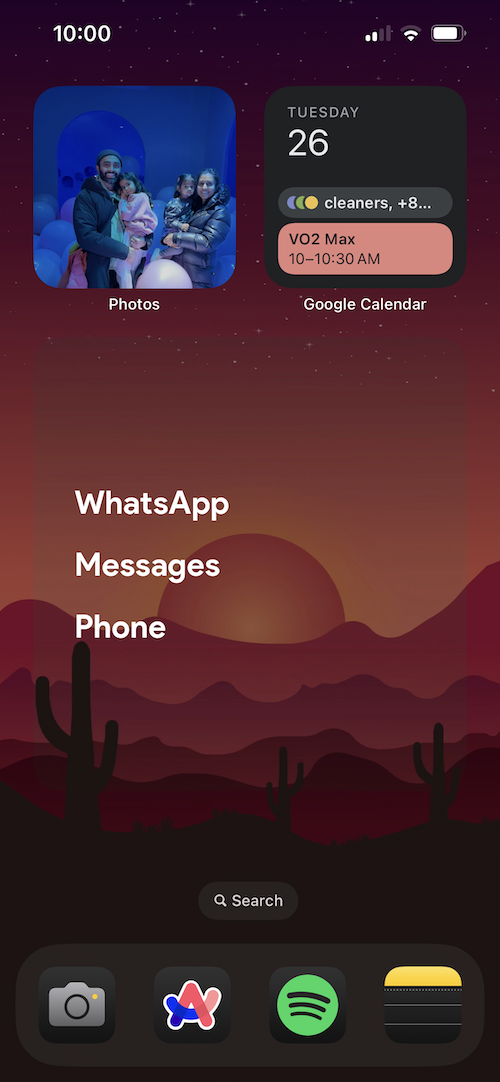Habits

I wrote this for my kids, but figured this could be helpful for my friends and family, so sharing more broadly. If you have any questions or want to dive deeper into anything, hit me up.
I was talking to a parent recently who has teenage kids, and she shared how the thing she regrets the most is getting them an Apple Watch—they’re always connected. I always find hearing what works (and doesn’t) from parents with older kids super helpful. It also reminded me how I’ve been focusing a lot on disconnecting from my phone during the sabbatical, so I thought it’d be helpful to write about all the habits I’ve been cultivating this past year. Most of these habits were tough to implement, but ultimately, they have made me feel better:
- No notifications on phone. Take back control of your life. You decide when to check your device; you have the power. Don’t let the apps on your phone control you. Notifications are a constant interruption, pulling you away from the present moment. You’ll end up distracted, addicted, and living the life a company wants you to live instead of a life aligned with your values.
- No icons or badges on phone. Start eliminating the need to check your phone constantly. I’ve dumbed down my phone to make it a complete utility thanks to this app, Minimalist Launcher (thanks, Aashay!). If there’s something really important, someone can call me. Otherwise, I check my phone when I want to—not when someone or something else tells me to. There’s no badge calling me to open an app. There’s no icon I can quickly tap. I need to read the title of an app or search for it. That little bit of friction is something I like—it makes me much more mindful of pulling out my phone unnecessarily. Now, I’ll catch myself pulling out my phone out of old habits, see there’s nothing to do on there, and put it back immediately. Here’s what my phone looks like now:


- Floss teeth in car. This is a silly one, but it’s important. If there are habits you want to add to your life, find creative ways to make them work for you. For example, I can’t be bothered at the end of the night to add one more thing (flossing) to my routine—I just want to get to bed. These dental flossers in the car are so convenient. Red light? I floss my teeth. Game changer.
- Alcohol Probiotic. Drinking is fun, but hangovers suck. To show up for you both, I need energy. So, I found this probiotic to take before drinking—it makes me feel WAY better the next day. Alcohol still dehydrates me, so I also take electrolytes (LMNT) if I know I’m drinking that night. Even with these hacks, I try to keep drinking to a minimum, usually ~1x/week socially.
- Sleep. Prioritize it. Your body needs rest and recovery. A good night’s sleep helps you show up so much better for the day. My sleep hygiene: 7 hours of sleep, EightSleep to cool the bed, pillow under my legs to avoid back pain, ergonomic pillow, sleep only on my side or back, white noise, blackout room. No phone before bedtime, no phone by the bedside, no phone when I wake up. I aim to sleep at a consistent-ish time most days. Magnesium and turmeric/ginger tea signal my body to wind down. If I’m not sleepy, I read before bed. Coffee at least 1 hour after waking, and if I have a second coffee, it’s no later than 3 p.m.
- Lacrosse balls everywhere. Desk, couch, car, bedside, bathroom, and of course, the gym. With sitting, working out, and general life activities, there are always tight spots or knots. Having lacrosse balls so accessible makes it easy to work those out. Paul gave me a great suggestion to roll out my feet while brushing my teeth—super helpful.
- Strength training. So important for longevity. Find a way to work out 3x/week. Get a trainer to show you the right way to do things when you first start. It doesn’t have to be heavy lifts—I do lots of tempo and range work (Poliquin method). Add stretching into your routine, especially as you get into your 20s and 30s. It’ll result in fewer injuries and a better quality of life.
- Cardio. Another staple for longevity—your heart needs to function well. Add Zone 2 training for 1 hour, 3x/week. I do it on the Peloton bike and take phone calls, listen to podcasts, or watch TV while riding. VO2 max training 1x/week—whatever helps you get through it. For me, I jam out to my favorite songs for 30 minutes on the bike.
- Recovery. Feeling good physically helps you mentally. Don’t let nagging injuries go untreated. I regret not getting checked out 10 years ago when I pulled something doing a heavy deadlift. I still deal with tight left glute pain regularly. Now I’m more proactive. I see a chiropractor monthly (Dr. Shaila—she’s amazing!) to fix any imbalances or tight/jammed spots. I get deep tissue massages every six weeks, focusing on specific body parts. Cold plunges are also great when my body feels sore or inflamed.
- Breathe. It’s easy to get caught up thinking about something that happened in the past or worrying about the future—it’s natural. But small moments of reconnection to the present through deep breaths help. Remember: the past is behind us, and the future hasn’t happened yet. The only thing you have is now. Zoom out. The things you’re worried about today, you’ll likely forget in the future.
- Practice. To get good at something, it takes commitment. You need to put in the practice—there’s no magic pill. Find joy in the process of getting better. It makes the reward much sweeter. This summer, I’ve been putting in consistent practice with golf and piano. The feeling of improving over time is so satisfying.
- Supplements. Some nutrients are hard to get naturally from food. Staying consistent with morning and evening supplements has helped me show up with better energy. Vitamin D, Theracurmin, and magnesium are staples in my routine. Get a physical once a year to establish a baseline and see what you might need to improve. This year, I’ve made meaningful progress on Vitamin D and cortisol through these habits + supplements.
- Sustainable diet. There are so many philosophies about what to eat. Find something you can maintain sustainably. For me, it’s focusing on protein and veggies. I aim for 80-100% of 1g/lb of protein most days. Less processed food, using fruit, nuts, or a protein bar for snacks, and drinking lots of water. I also start my morning with a green juice (AG1). And if I feel like having a cookie or ice cream, I do it. Listen to your body.
- Take time to reflect. A life with intention is a life well-lived. It’s easy to go into autopilot. Weekly reflections help me pause and see how my intentions from the previous week went. What went well? What didn’t? Why? Then I set new intentions for the following week. Over time, this compounds and helps you live a meaningful life.
- Don’t let the to-do list control you. It will never end. There’s always more to do. Figure out a system where you get the important stuff done without falling into the trap of crossing off items just to feel accomplished. I only plan a couple of items daily, and the endless list doesn’t paralyze me anymore. Ruthlessly prioritize.
- Call people. Relationships take effort—they don’t just happen. Find time to connect, whether it’s driving and catching up on a call, playing sports, or going on walks with friends. For some people in my life, I’ve set up recurring weekly/monthly calls.
- Find a therapist. As smart as you think you are, there’s always stuff you’re unaware of that causes unnecessary suffering. Assemble a team to help you work through the harder things. Everyone has challenges—it’s part of being human. The longer you push them down, the more they’ll impact your life in unhappy ways. Having someone to guide you, listen, and help you release those emotions is invaluable.
There’s plenty of stuff I still want to get better at, and I’ll keep sharing as I figure out what works. This list isn’t meant to be hard rules on how to live life. Take what resonates with you. I trust you both to know what’s best for you.
Love,
Your Dada




